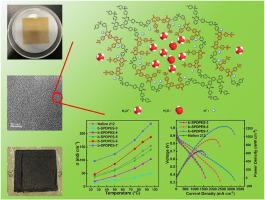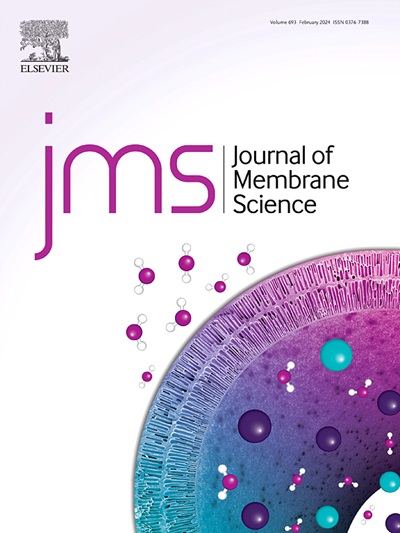High-performance proton exchange membrane derived from N-heterocycle poly(aryl ether sulfone)s with ether-free hydrophilic blocks and exhibiting good stability and proton-conducting performance
IF 8.4
1区 工程技术
Q1 ENGINEERING, CHEMICAL
引用次数: 0
Abstract
The trade-off issue between proton conduction properties and stability is a constraint on the commercial application of non-fluorinated proton exchange membranes for fuel cells. To alleviate the issue, the multi-block N-heterocycle poly(aryl ether sulfone)s with ether-free hydrophilic blocks (b-SPDPESs), which is composited by diphenyl sulfone moieties and biphthalazindione structures with dense pendant benzenesulfonic groups, are developed to prepare high-performance membranes. The self-assembly effect of block copolymers not only improves the membrane stability but also constructs regular proton conduction channels. Moreover, the conduction channel consists of hydrophilic blocks without ether bonds, which effectively improves the tolerance of the membrane to radicals. The hydrogen-bond network between sulfonic groups and N-heterocycles in the channel improves the proton conduction efficiency, inhibits the swelling of the membrane, and improves the stability of the membrane. As a result, the swelling degree of b-SPDPESs membrane is only 15.8 %, the proton conductivity is as high as 238 mS cm−1, the membrane aging broken time at 80 °C is between 4 and 6.6 h, and the fuel cells loading the membranes and feeding with hydrogen and air perform the max power density of between 0.65 and 1.25 W cm−2. Modulating the sequence structure of chains and constructing multiblock polymers containing ether-free N-heretrocyclic blocks with sulfonic groups improve the stability of membranes while ensuring their proton conductivity.

由具有无醚亲水嵌段的 N-杂环聚(芳基醚砜)衍生的高性能质子交换膜,具有良好的稳定性和质子传导性能
质子传导性能与稳定性之间的权衡问题制约了燃料电池非氟质子交换膜的商业应用。为了缓解这一问题,我们开发了具有无醚亲水嵌段的多嵌段 N-杂环聚(芳基醚砜)(b-SPDPES),它由二苯基砜分子和具有致密悬垂苯磺酸基团的双酞嗪二酮结构组成,用于制备高性能膜。嵌段共聚物的自组装效应不仅提高了膜的稳定性,还构建了规则的质子传导通道。此外,传导通道由不含醚键的亲水嵌段组成,这有效提高了膜对自由基的耐受性。通道中磺酸基团和 N-杂环之间的氢键网络提高了质子传导效率,抑制了膜的膨胀,提高了膜的稳定性。因此,b-SPDPESs 膜的溶胀度仅为 15.8%,质子传导率高达 238 mS cm-1,膜在 80 °C 下的老化破碎时间为 4 至 6.6 h,装载膜并输入氢气和空气的燃料电池的最大功率密度为 0.65 至 1.25 W cm-2。调节链的序列结构和构建含有磺酸基的无醚 N-heretrocyclic 嵌段的多嵌段聚合物可提高膜的稳定性,同时确保膜的质子传导性。
本文章由计算机程序翻译,如有差异,请以英文原文为准。
求助全文
约1分钟内获得全文
求助全文
来源期刊

Journal of Membrane Science
工程技术-高分子科学
CiteScore
17.10
自引率
17.90%
发文量
1031
审稿时长
2.5 months
期刊介绍:
The Journal of Membrane Science is a publication that focuses on membrane systems and is aimed at academic and industrial chemists, chemical engineers, materials scientists, and membranologists. It publishes original research and reviews on various aspects of membrane transport, membrane formation/structure, fouling, module/process design, and processes/applications. The journal primarily focuses on the structure, function, and performance of non-biological membranes but also includes papers that relate to biological membranes. The Journal of Membrane Science publishes Full Text Papers, State-of-the-Art Reviews, Letters to the Editor, and Perspectives.
 求助内容:
求助内容: 应助结果提醒方式:
应助结果提醒方式:


